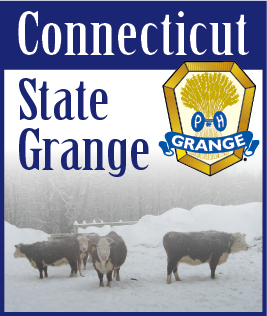| SEPTEMBER 6, 2014 -- Every year in August the Connecticut Agricultural Experiment Station (CAES) hosts Plant Science Day at Lockwood Farm in Hamden. Lockwood Farm is named after William Lockwood who was from Norwalk and willed his estate to the Connecticut Department of Agriculture. The estate was to use or to apply the income of the estate for the promotion of agricultural scientific investigation or experimentation. The state sold the initial property in Norwalk and eventually purchased the existing land in Hamden which was closer to the New Haven main laboratories. The land has been expanded on over the years and now consists of about 75 acres. One of the most significant discoveries to come out of Lockwood Farm is a revolutionary double-cross method developed in 1917 creating hybrid corn. The Governor is the official President of CAES oversight board or Board of Control and the Commissioner of Agriculture is also a board member.
The Grange has been regularly invited to attend Plant Science Day and join in a VIP luncheon for those who support the Experiment Station. I have had the opportunity to attend the Plant Science Day a couple of times and Charles Dimmick has attended every year.
Plant Science Day has many exhibits from different areas of the Department of Agriculture featuring different agricultural programs. CAES has displays highlighting different areas they are developing and maintaining such as monitoring the Emerald Ash Borer. The gardens of Lockwood Farms are open for visitors to wander through with some guided tours offered. Other agricultural friendly organizations such as the Connecticut Farmland Trust, FFA and UCONN Extension Service also have displays set up showing their support of Connecticut agriculture.
Each year there are a multiple of presenters addressing various agricultural issues. One topic discussed was the decline of the honeybees and bumblebees. It was noted that Connecticut has lost about half of its bee population these last two winters. They felt that the decline is a combination of many issues with no definitive answers. Another topic that was addressed was the challenge of the changes in climate over the last decade. They noted that the last decade was hotter and there were a record number of heavy rainfalls. This created bursts of heavy rains with flooding along with drought. The speaker suggested some ideas that farms may be able to capitalize on these changes such as taking advantage of the longer growing seasons and adjusting the crops they plant.
The Experiment Station presented a program on ways a farmer can explore diversifying their crops to targeted audiences. Some of the specialty crops they were working on included Belgian endive, sweet potato, okra and Chinese cabbage.
This year was the 104th Annual Connecticut Agricultural Experiment Station’s Lockwood Farm Plant Science Day. The event is a free and open to the public. Watch for it next year in August. |
